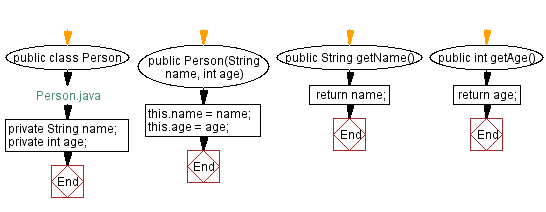Java: Create and print Person objects
Write a Java program to create a class called "Person" with a name and age attribute. Create two instances of the "Person" class, set their attributes using the constructor, and print their name and age.
Sample Solution:
Java Code:
// Define the Person class
public class Person {
// Declare a private variable to store the name of the person
private String name;
// Declare a private variable to store the age of the person
private int age;
// Constructor for the Person class that initializes the name and age variables
public Person(String name, int age) {
// Set the name variable to the provided name parameter
this.name = name;
// Set the age variable to the provided age parameter
this.age = age;
}
// Method to retrieve the name of the person
public String getName() {
// Return the value of the name variable
return name;
}
// Method to retrieve the age of the person
public int getAge() {
// Return the value of the age variable
return age;
}
// Method to set the name of the person
public void setName(String name) {
// Set the name variable to the provided name parameter
this.name = name;
}
// Method to set the age of the person
public void setAge(int age) {
// Set the age variable to the provided age parameter
this.age = age;
}
}
The above class has two private attributes: name and age, and a constructor that initializes these attributes with the values passed as arguments. It also has a getter method to access the attributes.
// Define the Main class
public class Main {
// Define the main method which is the entry point of the program
public static void main(String[] args) {
// Create an instance of the Person class with the name "Ean Craig" and age 11
Person person1 = new Person("Ean Craig", 11);
// Create another instance of the Person class with the name "Evan Ross" and age 12
Person person2 = new Person("Evan Ross", 12);
// Print the name and age of person1 to the console
System.out.println(person1.getName() + " is " + person1.getAge() + " years old.");
// Print the name and age of person2 to the console
System.out.println(person2.getName() + " is " + person2.getAge() + " years old.\n");
// Modify the age of person1 using the setter methods
person1.setAge(14);
// Modify the name and age of person2 using the setter methods
person2.setName("Lewis Jordan");
person2.setAge(12);
System.out.println("Set new age and name:");
// Print the updated name and age of person1 to the console
System.out.println(person1.getName() + " is now " + person1.getAge() + " years old.");
// Print the updated name and age of person2 to the console
System.out.println(person2.getName() + " is now " + person2.getAge() + " years old.");
}
}
In the above example, we create two instances of the "Person" class, set their attributes with the constructor, and print their name and age using the getter methods. We also modify the attributes using the setter methods and print the updated values.
Sample Output:
Ean Craig is 11 years old. Evan Ross is 12 years old. Set new age and name: Ean Craig is now 14 years old. Lewis Jordan is now 12 years old.
Flowchart:

For more Practice: Solve these Related Problems:
- Write a Java program to create a "Person" class with a method to compare the ages of two persons and determine who is older.
- Write a Java program to extend the "Person" class by adding an address attribute and a method to check if two people live at the same address.
- Write a Java program where the "Person" class has a static counter that keeps track of how many "Person" objects have been created.
- Write a Java program to implement a clone method in the "Person" class to create a deep copy of a "Person" object.
Go to:
Java Code Editor:
Improve this sample solution and post your code through Disqus.
PREV : Java Object Oriented Programming Exercises Home.
NEXT : Create and Modify Dog Objects.
What is the difficulty level of this exercise?
Test your Programming skills with w3resource's quiz.
